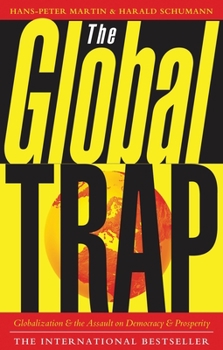The Global Trap
Select Format
Select Condition 
Book Overview
This extraordinary book explores the spread of globalization. The authors - journalists on Der Spiegel - provide an account that is highly informed, yet extremely readable. They show how... This description may be from another edition of this product.
Format:Paperback
Language:English
ISBN:1856495302
ISBN13:9781856495301
Release Date:October 1997
Publisher:Zed Books
Length:280 Pages
Weight:0.75 lbs.
Dimensions:0.7" x 5.4" x 8.5"
Customer Reviews
5 ratings
The Global Trap
Published by Thriftbooks.com User , 20 years ago
I've read this book when it first was published in Poland five years ago. The first thought that came to my mind was: How the hell could I have been so blind not to see what is going on in the world? There is no need to write about this book. You just have to read it! The question is: What can we do not to go to the 20:80 formula? And can we still do anything?
A preview of things to come?
Published by Thriftbooks.com User , 24 years ago
Although this book was written in 1995-1996, it is worrying that events that happened since were correctly predicted by the authors. A bit depressing, as another reviewer remarked, but the signs are there. "Globalisation and fragmentation", as it is put in the book. As a professional couple, we will probably find a place amongst the 20% employed - for as long as the corporate masters need us anyway - should we be willing to follow the new corporate slogan of "if you are awake, you are at work". And as someone who grew up in the so-called "third world", I have seen a few sides of the argument. I would describe the book as "sane" rather than "left-wing". One really has to put into question the value of "democracy" as persued by the Americans and others, on behalf of the large corporations. How much power do central governments really have these days? Thoroughly researched, well written, and informative. A must read.
Globalization as ideological apparatus
Published by Thriftbooks.com User , 25 years ago
A thought-provoking insight into the negative repercussions of the phenomenon of globalization, this book debunks quite a few taken-for-granted assumptions about the relationship between the globlization of financial markets and socio-economic welfare. The argument that the various forms that globalization is taking have destabilizing effects on social relationships runs throughout the book, somehow urging the reader thereby to pause at sseveral points in the reading process to re-examine his/her coneptions about globalization and economic growth. The convivial tone in which the the authors make their forceful pronouncements on the subject at hand is highly appreciated; one indeed feels that the authors sort of seek to establish some kind of complicity against the forces of control and domination (no wonder the book was reprinted nine times in Germany and was translated into many languages). It also does so by demystifying the ostensibly neutral developmental aims of corporate business. The socioeconomic havocs that have been wreaked in the name of globalization find ample room in this cogently argued book. A good reference book this is. M. Karimi, Ph.D
An excellent look behind the myth of capitalism.
Published by Thriftbooks.com User , 25 years ago
This book should be on the shelves of every college library across the globe. It is clearly written and easily understood and gives the reader a good insight into the many myths and contradictions that surround our capitalist economic system. It not only criticize's the system, but also points out what can be done to incorporate a more socially just monetary path for future generations WITHIN the present system. One point that I feel bound to make, the book could be viewed as being a little depressing, and may leave the reader feeling somewhat helpless when faced with the seemingly impossible task of trying to change things, so it is important to read the book to the end. Take a break, then draw your conclusions.
To tell the truth of the world economic realities and more
Published by Thriftbooks.com User , 26 years ago
I have always been dissatisfied with the argument of the present mainstream economics that the free flow of products, know-how and investment will improve the well-being of all our people, including economically disadvantaged populations within our respective countries. On the contrary, the global gigantic investors' blind pursuits of monetary profits have already forced the respective countries to go through the disintegration of the society, collapsing of their own policy-making system, destruction of their sustainable environment, devastating the ground for rational discussion on the direction in which they should go. If you are one of those who feel disgusted at the mainstream economics' disguise like that, this book will turn out to be the greatest relief. This book goes beyond a mere presentation of a possible catastrophe of the world's economic system and build up the moral justification of this discussion. Its development of theories are based on so irrefutable and irrefragable evidences that can't be resisted. I have read the Korean version of this book but the implication of it is always clear : "Don't leave the human society's precious values at the hands of economic lust."






